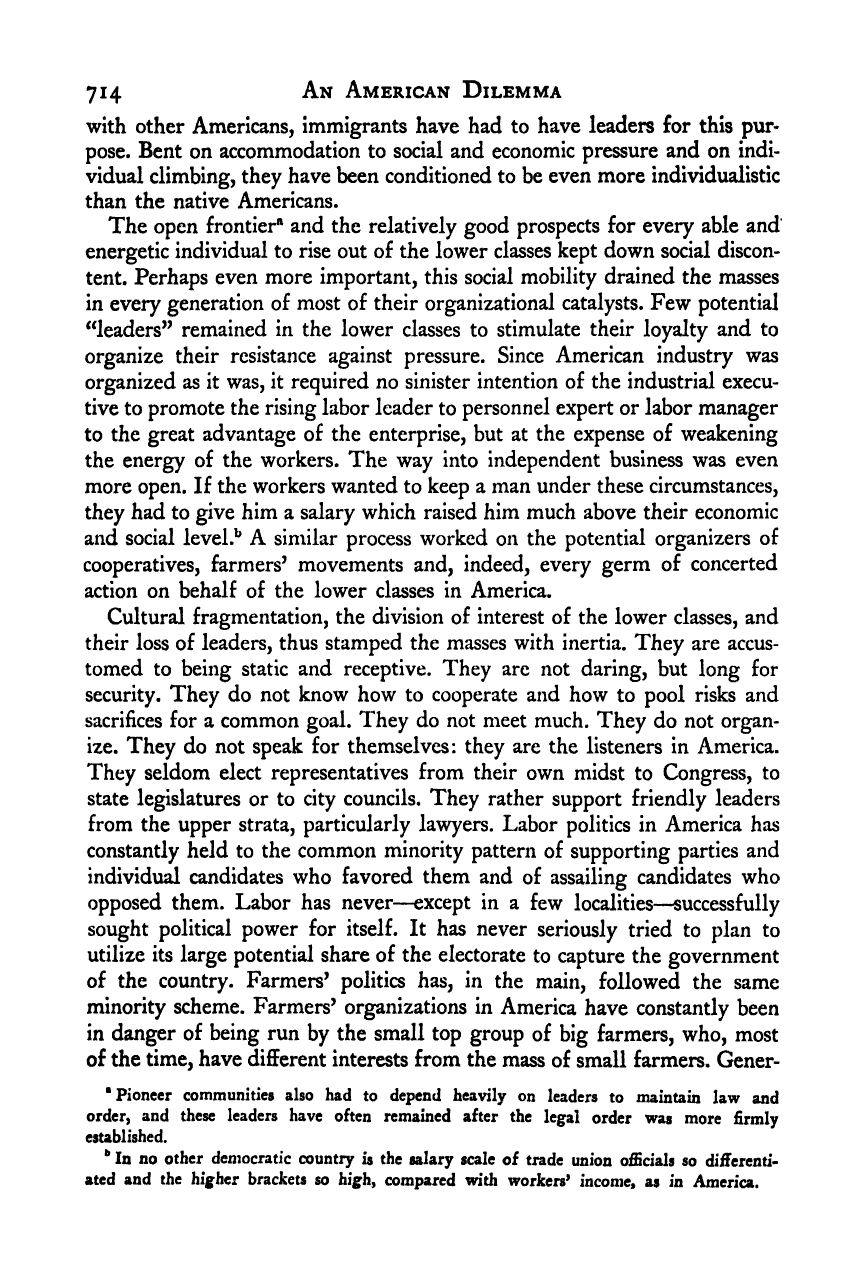Note: Gunnar Myrdal died in 1987, less than 70 years ago. Therefore, this work is protected by copyright, restricting your legal rights to reproduce it. However, you are welcome to view it on screen, as you do now. Read more about copyright.
Full resolution (TIFF) - On this page / på denna sida - IX. Leadership and Concerted Action - 33. The American Pattern of Individual Leadership and Mass Passivity - 3. Mass Passivity

<< prev. page << föreg. sida << >> nästa sida >> next page >>
Below is the raw OCR text
from the above scanned image.
Do you see an error? Proofread the page now!
Här nedan syns maskintolkade texten från faksimilbilden ovan.
Ser du något fel? Korrekturläs sidan nu!
This page has never been proofread. / Denna sida har aldrig korrekturlästs.
714 An American Dilemma
with other Americans, immigrants have had to have leaders for this pur-
pose. Bent on accommodation to social and economic pressure and on indi-
vidual climbing, they have been conditioned to be even more individualistic
than the native Americans.
The open frontier" and the relatively good prospects for every able and
energetic individual to rise out of the lower classes kept down social discon-
tent. Perhaps even more important, this social mobility drained the masses
in every generation of most of their organizational catalysts. Few potential
^^leaders” remained in the lower classes to stimulate their loyalty and to
organize their resistance against pressure. Since American industry was
organized as it was, it required no sinister intention of the industrial execu-
tive to promote the rising labor leader to personnel expert or labor manager
to the great advantage of the enterprise, but at the expense of weakening
the energy of the workers. The way into independent business was even
more open. If the workers wanted to keep a man under these circumstances,
they had to give him a salary which raised him much above their economic
and social level.’^ A similar process worked on the potential organizers of
cooperatives, farmers’ movements and, indeed, every germ of concerted
action on behalf of the lower classes in America.
Cultural fragmentation, the division of interest of the lower classes, and
their loss of leaders, thus stamped the masses with inertia. They are accus-
tomed to being static and receptive. They arc not daring, but long for
security. They do not know how to cooperate and how to pool risks and
sacrifices for a common goal. They do not meet much. They do not organ-
ize. They do not speak for themselves: they are the listeners in America.
They seldom elect representatives from their own midst to Congress, to
state legislatures or to city councils. They rather support friendly leaders
from the upper strata, particularly lawyers. Labor politics in America has
constantly held to the common minority pattern of supporting parties and
individual candidates who favored them and of assailing candidates who
opposed them. Labor has never—except in a few localities—successfully
sought political power for itself. It has never seriously tried to plan to
utilize its large potential share of the electorate to capture the government
of the country. Farmers’ politics has, in the main, followed the same
minority scheme. Farmers’ organizations in America have constantly been
in danger of being run by the small top group of big farmers, who, most
of the time, have different interests from the mass of small farmers. Gener-
* Pioneer communities also had to depend heavily on leaders to maintain law and
order, and these leaders have often remained after the legal order was more firmly
established.
**
In no other democratic country is the salary scale of trade union officials so differenti-
ated and the higher brackets so high, compared with workers’ income, as in America.
<< prev. page << föreg. sida << >> nästa sida >> next page >>